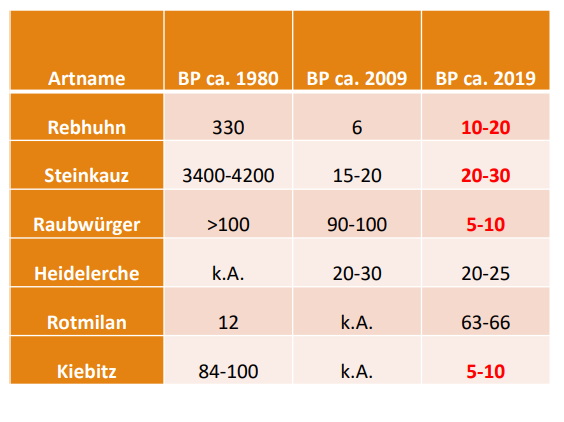
A terrifying yet unsurprising study has just been published about biodiversity in Luxembourg, "in freefall". 😟 This is a tiny country, the size of Greater London roughly divided in two: a wooded, hilly North & a flatter agricultural, urban and industrial South 🇱🇺 🐄🌾🌲🏭🏗️ 1/n 





2/n Luxembourg is sadly famous for its 600 banks. There's scientific knowledge through @naturmusee & cross-borders projects. But the economic pressure is strong. Urbanisation, property speculation & infrastructure projects are rampant. Perhaps this study will be an eye-opener? 





3/n Here are some the findings: 68% of habitats are in poor/bad conservation state, only 16% of grasslands in good state. 83% of fauna/flora in poor/bad state - populations of Grey partridge ↘️from 330 in 1980 to 10 now ; Little owl ↘️from 3400 to 20 😱 🐦🦉🦤 

4/n Whether birds (as a separate group), habitats or protected species are considered, agriculture 🧑🌾👩🌾is in fact the key pressure, followed by urbanisation and habitat changes. Other pressures on Luxembourg habitats include changes such as water use, forestry, climate change 

5/n The state of Luxembourg's water bodies has also been studied: out of 98, 51% are in average conservation status, 23% unsatisfactory & 20% in bad status. Same with groundwater table. The culprits? Pesticides and nitrates, probably from agriculture. 





6/n The conclusions are brutal & could probably fit other countries than Lux: "no improvement in the state of the environment with current agricultural policies", "trend towards further deterioration of biodiversity and water quality", "lack of ecologically effective measures" ☠️ 

7/n Only 4.6% of Luxembourg's agricultural land is farmed organically (EU average: 8.5%). Interestingly, measures that are well accepted by farmers & get most money 💵(eg compensation) are also the least environmentally effective...🥀 

8/n Urbanisation can be limited through political will. But what about agriculture, that seems to be the main driver of biodiversity loss in Lux? 🌻 This is very interesting, because it fits within current discussions on the EU CAP... 🇪🇺 The study explores three strategies: 

9/n The strategies form part of the CAP reform, but negotiations are still ongoing, with push-pull between EU commission, parliament & the Agriculture Council. Hardly surprising (popular measures=least constraining=often the least effective). Luxembourg is no exception. 

10/n Conditionality use a set of standards that member states & farmers have to comply with: for example, preserving a certain area of permanent grassland, non-farmed margins, 5% of fallow land, protection of Natura2000 grasslands etc 

11/n The eco-schemes are a new thing - payments for farmers/states that go the extra mile & promote better practice, with targets to be defined at national or local basis. And third, we have "agri-environment-climate measures" around carbon, reduced fertilisation & pesticide use
12/n Obviously, this is a *very* complicated machinery, to be implemented at European, national, regional and local level. The question is: will a new CAP solve the agriculture-related biodiversity loss in Luxembourg and elsewhere? 🍃 

(continued) 13/n This is a need analysis for land covered by biodiversity measures. 1st column is the surface (in ha) that SHOULD fall under measures, 2nd column is the surface that DOES. Massive shortfall, both for grassland (pastures) and agricultural land (extensive crops) 

14/n The estimated need for Luxembourg is the implementation of "ecologically effective" measures on 30% of grassland and 25-30% of arable land. Needless to say, the country is far, far, from that (as are many in Europe). 

15/n Similarly, for water, strong measures SHOULD be implemented too: voluntary measures on 12,000 out 16,000 ha of "water protection areas", reduction of fertilisation & pesticides, cover crops, riparian buffer stips, conversion to grassland etc...💧 



16/n Can the new CAP deliver these objectives? There are many debates on the topic in EU countries, with worries that the "compulsory" measures lack strength, and that they will only marginally improve the situation, certainly not enough to elicit long-term change & stop decline 

17/n The study is highlighting possible additional measures: stricter control in water protection areas, bonuses for organic farms, training and support to farmers or debt relief conditional to better practices. 🐄🤠🐏🌱🌼 

18/n More interestingly, the Luxembourg study also proposes "creating perspectives for agriculture" through marketing for sustainable products, consumer awareness with a view to create a "social contract". 👨🌾🇱🇺 

19/n The aim is to find "joint solutions between agriculture and nature conservation". But the study concludes by saying that ultimately, "political will is the basis". Will the EU 🇪🇺 and Luxembourg's 🇱🇺 politicians act NOW? It has never been more urgent... 

20/n (final tweet) If anyone is interested in Luxembourg's nature & conservation, I'd recommend following @naturmusee @Natur_an_Emwelt @MNHNLdigitise @MNHNLbiodiv @Greenpeace_Lux (and the very cool company @space4env doing mapping for the environment)
• • •
Missing some Tweet in this thread? You can try to
force a refresh









